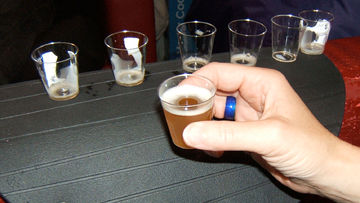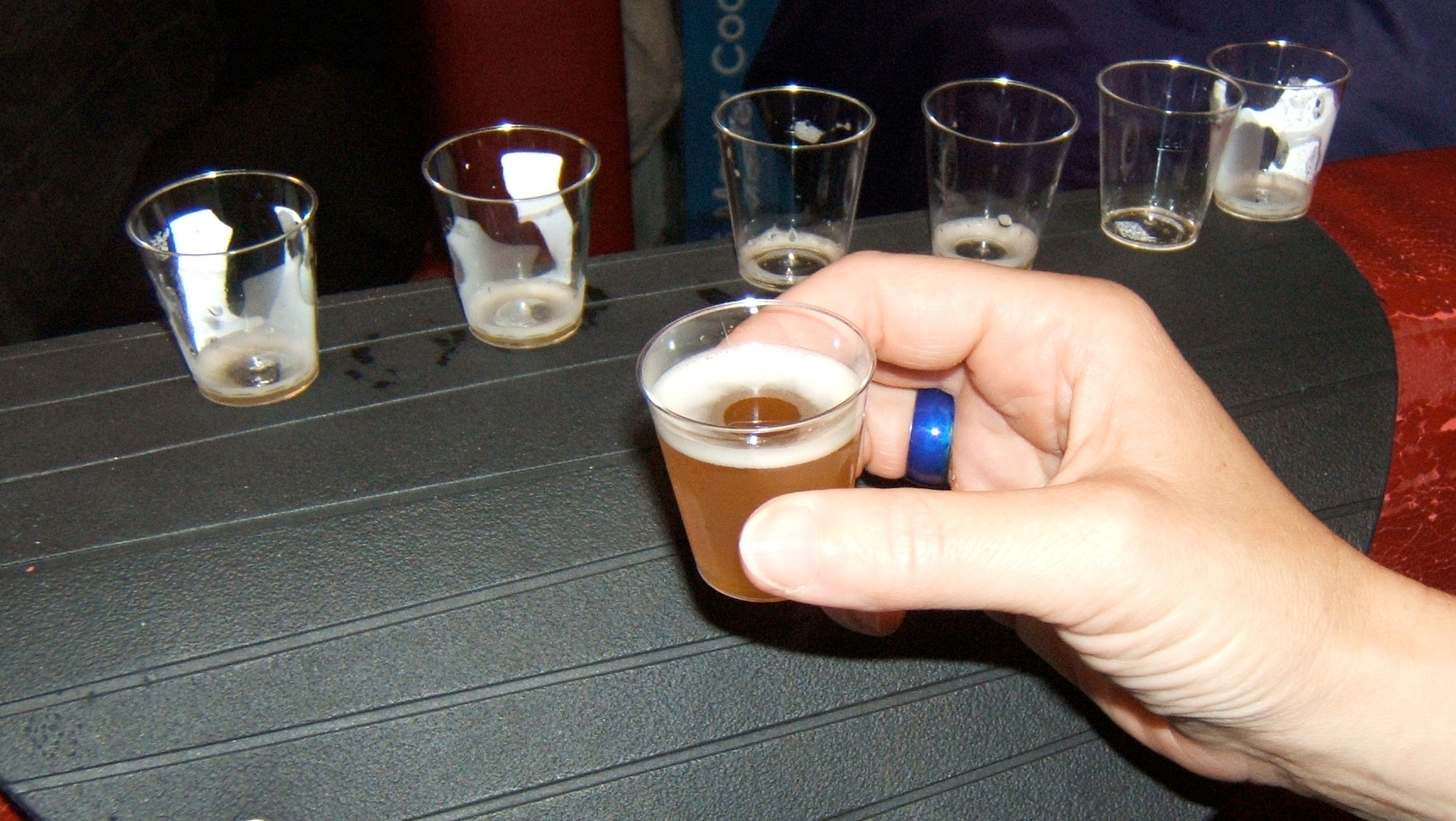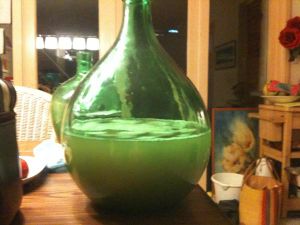k (→Mate mead) |
k (→Mate mead) |
||
| Regel 132: | Regel 132: | ||
::;Notes | ::;Notes | ||
::[[Gebruiker:Lurwah|Lurwah]]: Full taste of honey, without the sweetness of sugar. Notes of Mate come through quite well balanced with the smell and taste of the honey. Takes some getting used to, but very drinkable. Not headache material. | ::[[Gebruiker:Lurwah|Lurwah]]: Full taste of honey, without the sweetness of sugar. Notes of Mate come through quite well balanced with the smell and taste of the honey. Takes some getting used to, but very drinkable. Not headache material. | ||
| − | ::[[Gebruiker:WitchDoc|WitchDoc]]: Had a few glasses and liked it very much. Although i'm not sure if it can be contributed to the Mate in the mead | + | ::[[Gebruiker:WitchDoc|WitchDoc]]: Had a few glasses and liked it very much. Although i'm not sure if it can be contributed to the Mate in the mead I had a hard time getting to sleep that night. |
| + | :: [[Gebruiker:Moem|Moem]]: I found it surprisingly unsweet. Mate hard to detect, but present; honey not all that noticeable, either. Quite tasty tough. Moar plz! | ||
===Mate wine=== | ===Mate wine=== | ||
Versie van 28 mei 2012 17:39
| Project: Hack42-Mate | |
|---|---|
| Naam | Hack42-Mate |
| Door | Lurwah |
| Status | Uitvoer |
| Madskillz | Cooking, Weighing, Measuring, Stirring |
| Doel / Omschrijving | |
| In which I try to develop a recipe for our own Club-Mate derivative. | |
| Alle Projecten - Project Toevoegen | |
Hack42-Mate
My goal is to develop a recipe for an enjoyable Mate-based soda. If eventually found to be good (enough), we might decide to drink our own Mate instead of buying Club-Mate. Whether we do this or not, it is always possible to brew a batch for a party or large event. Who would say no to a keg of home-brew Mate?
- Notes
- Hack42 consumption statistics (2011):
- sept: 4.3 aug: 4.6 jul: 4.6 jun: 2.5 (bottles (0.5 liter) per day)
- Salt might help against bitterness
First Iteration
In this iteration I tried to find out a basic recipe that works, or points towards the right direction. I brewed six different bottles of Mate-soda, based on recipes I found. The plan was to make three basic recipes twice and brew the Mate for either five or seven minutes, resulting in six different batches. The three basic methods were:
- Brew Mate, dissolve sugar. Add citric acid.
- Brew Mate, caramelise then dissolve sugar. Add citric acid.
- Add Mate to the caramelising sugar, then brew. Finally, add citric acid.
This last method is based on the traditional preparation of yerba mate tea. All recipes were cooled to serving temperature and then carbonated with a SodaClub machine. I gathered a taste panel during one of our meets for a "blind" (they didn't know the recipes) tasting of the several batches I brewed. Of course, I also gave them a glass of the original Club-Mate (some people didn't like Club-Mate as much as Club-Mate...). They kindly gave their feedback, a summary of which can be found below the recipes.
Recipes
Note: All degrees(°) are in centigrade.
- Version 1.
- 1 liter water (90°)
- 1 gram citric acid (dissolved)
- 70 grams sugar (dissolved)
- 20 grams Mate (brew for five minutes)
- (Note: Resulted in rapid expulsion of copious amounts of foam after adding CO2)
- Version 2.
- 1 liter water (90°)
- 1 gram citric acid (dissolved)
- 70 grams sugar (caramelised, then dissolved)
- 20 grams Mate (brew for five minutes)
- Version 3.
- 1 liter water (75°)
- 1 gram citric acid (dissolved)
- 70 gram sugar (caramelised with 20 grams Mate) (brew for five minutes)
- Version 4.
- 1 liter water (75°)
- 1 gram citric acid (dissolved)
- 70 grams sugar (dissolved)
- 20 grams Mate (brew for seven minutes)
- Version 5.
- 1 liter water (75°)
- 1 gram citric acid (dissolved)
- 70 grams sugar (caramelised, then dissolved)
- 20 grams Mate (brew for seven minutes)
- Version 6.
- 1 liter water (70°)
- 1 gram citric acid (dissolved) (Possibly 2 grams; I was unsure whether I had added it.)
- 70 grams sugar (caramelised with 20 grams Mate) (brew for seven minutes)
Question form
The question is no longer accepting responses. It was available here.
Results
- Bottle label to recipe key
- A:6
- B:1
- C:Original Club-Mate
- D:5
- E:2
- F:4
- G:3
The Dutch results are here. (Summary: Version 3&6 were most popular)
I have not yet seen anybody use the recipes in version 3 & 6 to make a Mate-soda. So for me it was an exciting result, that these turned out to be the better tasting ones. I decided after the tasting to work on these two recipes in the future.
Second iteration
- Build on Version 3&6.
- Less sugar (50/60 grams per liter?)
- More citric acid(2 grams per liter)
- Caramelise further (Let the sugar turn orange-brown, then add Mate.)
- Brew for 6 minutes at 70-75°C
Recipes II
Not yet available.
Question form II
The second question form voor Hack42-Mate can be found here.
Results II
The second set of (Dutch) results are here.
Future iterations
- Plans
- Further improve base recipe
- Work on a "natural flavour" recipe
- Research kegging and preservation techniques
- Research methods of carbonation (baking soda,fermentation(!),&c.)
The original Club Mate
Water Corn syrup Sugar Mate tea extract (0.4g mate in 100ml) Citric acid Coffeine flavor (probably just raw coffeine extracted from coffee beans) Natural flavor Caramel color (E150d, the bad one) Carbondioxide
Found Recipes
While researching I found some recipes of others trying to brew, or brewing, their own Mate soda. I collected those recipes on this page.
Fermentation
Mate mead
I decided to take a sidestep from making Hack42-Mate. I wondered if it would be possible to make an alcoholic version of my Mate recipe. The most natural way seemed to be a mead. The recipe was based on mead recipes I found here and on the two best Mate recipes (3 & 6) from the First Iteration.
- The recipe
- 4 liter water (73°C)
- 10 grams citric acid (dissolved)
- 280 grams sugar (caramelized with 100 grams Mate) (brew for six minutes)
- 1350 grams honey (dissolved in 1 liter of boiling water)
- 4 grams yeast (Saccharomyces Cerevisiae var. Cerevisiae)
- Log
- 2011/12/29: Started ferment. Measured OG at 20°C: 1.097 (OG = original gravity)
- 2012/01/14: First racking. Measured SG at 20°C: 1.048 (SG = specific gravity)
- Calculated ABV: 6.77%
- 2012/01/20: Second racking. Measured SG at 18°C: 1.041
- Calculated ABV: 7.69%
- 2012/01/25: Fermentation slowed down to a stop after the second racking.
- Made a yeast starter with 200 ml of warm water, inverted sugar, 3-4 grams of yeast. Pitched at room temperature.
- 2012/03/18: Fermentation seems to have finished. Needs to be racked and measured soon.
- 2012/03/22: Third (and final) racking. Measured SG at 19°C: 1.008
- Calculated ABV: 11.85%
- 2012/05/27: Tasting session. First opening of the bottle. Racked one .5 liter bottle to age.
- Notes
- Lurwah: Full taste of honey, without the sweetness of sugar. Notes of Mate come through quite well balanced with the smell and taste of the honey. Takes some getting used to, but very drinkable. Not headache material.
- WitchDoc: Had a few glasses and liked it very much. Although i'm not sure if it can be contributed to the Mate in the mead I had a hard time getting to sleep that night.
- Moem: I found it surprisingly unsweet. Mate hard to detect, but present; honey not all that noticeable, either. Quite tasty tough. Moar plz!
Mate wine
Planned:
- Recipe
- 5 liter water
- 1 kg dextrose
- 100 gram Mate
- 4 gram yeast
Possible methods of preparation:
- One
- Brew Mate at 73°C
- Dissolve sugar
- Cool down to ~25-30°C, add yeast
- Ferment
- Two
- Dissolve sugar
- Cool down to ~25-30°C, add yeast
- Ferment
- Brew Mate at room temperature
- Three
- Dissolve sugar in 4 liter of water
- Cool down to ~25-30°C, add yeast
- Ferment
- Brew Mate in 1 liter of water at 73°C
- Add brewed Mate to fermented sugar solution
- Four
- Dissolve sugar
- Cool down to ~25-30°C
- Add yeast and Mate
- Ferment while (cold) brewing Mate
- It might be necessary to remove the Mate before the ferment is finished


